| Topic: | Making Colombo a Globally Competitive City |
| Date/Time: | 3rd November 2015 | 18:00 - 21:30 Hrs and 4th November 2015 | 07:30 - 19:00 Hrs |
| Venue: | Oak Room, Cinnamon Grand |
| Host: | Lakshaman Bandaranayake | Founding Publisher, Director | Lanka Business Online |
| Inquiries: | Lakshaman Bandaranayake | lakshaman@lbo.lk | 071 176 0167 or 072 776 0167 General | 071 466 0060 | summit@lbo.lk |
| Registration fee: | Rs. 17,900/= per participant, 5% discount for groups of 5 upto 9 and 10% discount for groups of 10 or more |
![]()
Summit Booklet | Low | High [20+MB]
- Description
- Agenda
- Sessions & Speakers
- Resources
- Microsoft CityNext
- Cinnamon Life
- J T Singh Labs
- Presentations
Description
INVESTMENT IN INFRASTRUCTURE UNLOCKS GROWTHInfrastructure projects can generate significant economies of scale and have a wider impact on growth. New and updated infrastructure can generate productivity gains (Fries et al., 2012) and enhance Total Factor Productivity (TFP) by lowering transaction costs and allowing more efficient use of inputs (Bottini et al., 2012). Built Environment in urban areas is considered one of the vital drivers of economic development. Built environment facilitates rapid development of urban areas -where the key economic activities tend to take place. The relationship between urbanization and income (GDP per capita) is very strong for many developing countries.
CITIES TAKING THE CENTER STAGEEmpirical research suggests that economic growth and urbanization go hand in hand and there is a general recognition that in the 21st century, cities are moving to the center stage. The world is experiencing an unprecedented urbanization and the cities in emerging markets are propelling the most significant economic transformation in history. Cities, furthermore, are fast coming to function as the basic motors of the regional and global economy. Indeed, it is argued that there is a new form of global city-centric capitalism where cities operate as territorial platforms for much of contemporary economic activity.
Cities are said to thrive on the creativity, productivity and innovation-enhancing effects of dense and multifaceted urban environments that are simultaneously embedded in worldwide business networks (Scott, 2001). Thus, it’s the globally competitive cities that will make nations competitive in global landscape, not the pastoral rural. Developing nations are aspiring to build major urban centers that are globally competitive, serving as magnets of growth, crucibles of innovation, and most importantly, thriving places full of desirable, livable spaces, while battling disincentives of scale. There is a growing global investor appetite for investing in opportunities around urbanization and emerging global cities. World class built environment, ability to attract capital; attract, nurture and retain talent and inventive capabilities to crate new value characterize globally competitive cities.
Colombo has a high potential to become a global city. The geographic location and close proximity to maritime sea routes are strategic advantages. Its geo-location is an exploitable asset in the global economy. However, It is not only the access to “Silk Road” that global cities compete with each other now, but for capital, talent and ideas. Presently Colombo is ranked 102 (out of 120 cities) in Global Competitive Index compiled by The Intelligence Unit of The Economist.
According to the current projections Colombo will slip to 108th position in next ten years; behind a host of Indian (Ahmadabad, Chennai, Pune, Hyderabad, Delhi and Mumbai), Middle Eastern (Dubai, Doha, Abu Dhabi) and Far Eastern (KL, Singapore, Bangkok, Manila and Jakarta) cities. If these projections to be proven wrong and Colombo to move up the ranking and recognized as a globally competitive city in the knowledge driven and highly networked global economy, the city needs to build new features and capabilities. Going by the “The Economist” study the city needs to improve significantly in the following areas.
- Economic strength
- Physical capital
- Financial maturity
- Institutional character
- Social and cultural character
- Human capital
- Environment and natural hazards
- Global appeal
This would demand harnessing the power of cross boarder flow of capital, knowledge, talent and ideas. Developing policy frameworks that will facilitate building new capabilities, broader connectivity and engagement with regional and global economies. The inaugural LBR LBO Infrastructure Summit 2015, themed as “Making Colombo a Globally Competitive City” will bring together industry representatives, investors and financial intermediaries, development experts, policy makers, researchers and academic to discuss some of the vital issues in six different insightful and thought provoking sessions.
PURPOSE LBR LBO Infrastructure Summit will:Develop synergy and symbiosis among multiple stakeholders in infrastructure development eco-system: relevant ministries and agencies government of Sri Lanka, investors, multilateral financial institutes, developers, contractors, consultants, technology partners, research institutes and universities, industry chambers and other relevant parties.
- Provide a platform to discuss and debate opportunities and challenges in infrastructure development in Sri Lanka.
- Aim to positively influence government policy
- Government: Relevant agencies and scientific institutions (UDA, RDA, CECB, ICTA, CEB and utility providers, SLPA, Civil Aviation, Military, Coastal Conservation, Finance Ministry, Treasury, Central Bank etc )
- Universities and research institutions
- Developers, investors, service providers, architects and urban planners, logistics and transport and logistics companies
- Multi-lateral financial institutes, development agencies,
- Commercial banks, investment banks, Banks, insurance and other financial services
- Technology companies
- Media
- Various other related service providers
Agenda
| TUESDAY 3rd NOVEMBER- DAY 1: SUMMIT INAUGURATION AND OPENING SESSION | |
| 1800 - 1810 | Welcome, opening remarks and partner recognition and appreciation |
| 1810 - 1830 | Speech by Chief Guest Hon. Patali Champika Ranawaka Minister of Megapolis and Western Region Development |
| 1830- 2015 | SESSION 1: CITIES OF THE FUTURE: WHAT DO THEY LOOK LIKE, HOW DO WE BUILD THEM? |
|
|
| 2015 - 2030 | Closing remarks |
| 2030- 2130 | Fellowship: Courtesy Microsoft CityNext |
| WEDNESDAY 4TH NOVEMBER – DAY 2 | |
| 0730 - 0845 | Pre-Summit – Registration, networking breakfast |
| 0845 - 0900 | Welcome and opening remarks |
| partner recognition and appreciation | |
| 0900 - 1040 | SESSION 2: MAKING COLOMBO A GLOBAL CITY: OPPORTUNITIES AND CHALLENGES |
|
|
| 1040 - 1100 | Tea/Coffee |
| 1100 - 1115 | Partner feature presentation 1 |
| Partner feature presentation 2 | |
| Partner feature presentation 3 | |
| 1115 - 1300 | SESSION 3: CREATING A WORLD CLASS TRANSPORTATION SYSTEM IN COLOMBO |
|
|
| 1300 - 1345 | Lunch |
| 1345 – 1530 | SESSION 4: INVESTMENT STRATEGIES AND BUSINESS MODELS FOR BUILDING A GLOBAL CITY |
|
|
| 1530 – 1545 | Tea / Coffee |
| 1545 - 1600 | Partner feature presentation 4 |
| Partner feature presentation 5 | |
| Partner feature presentation 6 | |
| 1600 - 1730 | SESSION 5: REIMAGINING COLOMBO THROUGH TECHNOLOGY |
|
|
| 1730 - 1745 | Concluding Remarks |
| 1745 – 1900 | After Summit networking reception - Courtesy MillenniumIT |
Sessions & Speakers
 Chief Guest
Hon. Patali Champika Ranawaka
Minister of Megapolis and Western Region Development
Hon Ranawaka Arachchige Patali Champika Ranawaka is a Member of Parliament of Sri Lanka representing the Colombo District. He is a businessman by profession.
Presently he holds the portfolio of Megapolis & Western Region Development. Previously he has held the portfolios of Environment and Natural Resources, Power and Energy and Technology, Research and Atomic Energy. Minister Ranawaka is a member of two parliamentary committees; Committee on Parliamentary Business and Committee of Selection.
As the Minister in charge of Western Region Development, Hon Ranawaka will lead the establishment of Western Region Megapolis which will address several social, environmental and economic challenges through revolutionary and transformative initiatives and increase economic opportunities and global competitiveness of the nation.
A prolific writer, highly skilled orator, policy and political critic and a popular national leader; Minister Ranawaka has authored many publications on issues of vital national importance.
Minister Ranawaka earned his BSc in Electrical and Power Engineering from University of Moratuwa.
Chief Guest
Hon. Patali Champika Ranawaka
Minister of Megapolis and Western Region Development
Hon Ranawaka Arachchige Patali Champika Ranawaka is a Member of Parliament of Sri Lanka representing the Colombo District. He is a businessman by profession.
Presently he holds the portfolio of Megapolis & Western Region Development. Previously he has held the portfolios of Environment and Natural Resources, Power and Energy and Technology, Research and Atomic Energy. Minister Ranawaka is a member of two parliamentary committees; Committee on Parliamentary Business and Committee of Selection.
As the Minister in charge of Western Region Development, Hon Ranawaka will lead the establishment of Western Region Megapolis which will address several social, environmental and economic challenges through revolutionary and transformative initiatives and increase economic opportunities and global competitiveness of the nation.
A prolific writer, highly skilled orator, policy and political critic and a popular national leader; Minister Ranawaka has authored many publications on issues of vital national importance.
Minister Ranawaka earned his BSc in Electrical and Power Engineering from University of Moratuwa.
Session 1 : Cities Of The Future: What Do They Look Like, How Do We Build Them?
Cities - habitat to half of world population - now generate over 80% of the global GDP. According to a study by “The Economist “(2012), already global business is beginning to plan strategy from a city, rather than a country, perspective. Given the rapid growth and development of many cities, competition between them for business, investment, ideas and talent will only get fiercer.
Legacy, scale and geo-location alone no longer determine a city’s global attractiveness and growth potential. While some megacities, such as London, New York, Paris and Tokyo, continue to be immensely influential in global economy, many cities - such as Hong Kong, Singapore, Taipei, Copenhagen and Stockholm - have established themselves as globally competitive centers in recent years.
Competitiveness is not determined only by a single criterion. It is a holistic concept and is the result of synergistic effect of multiple factors. Prominent among them are innovation, economic dynamism, governance and infrastructure.
INNOVATION: TOMORROW’S DIFFERENTIATORThe consulting firm A T Kearney’s latest in-depth analysis of global cities identifies Innovation as tomorrow’s differentiator. A city’s ability to create a differentiated value proposition to citizens, investors and other stakeholders depends on its ability to create and leverage a culture of innovation.
Innovation is not just about leveraging technology. It is about creating new stakeholder value by challenging the status quo and building new operating and business models based on fresh value propositions. The A T Kearney study further revealed that innovation is going make one city potentially stand out in the future among many dynamic places. Cities big and small are awakening to innovation’s power to drive growth. As technology continues to disrupt entire industries—basically changing the way people live—cities that create an environment and buzz that attract entrepreneurs, while also hanging onto their home-grown talent, will be best positioned for future success.
ECONOMIC DYNAMISMS: DRIVER OF STRUCTURAL TRANSFORMATIONEconomic dynamism creates structural transformations in cities; enabling them to move up in value chain. Cities which fail to instill changes in their economic systems over time- particularly those reflected in the behavior of markets, businesses, and the general economy – will gradually lose their competitiveness. Reflecting the transformation in the global economy, the 21st century will see the emergence of cities which build their competitiveness on knowledge-based industries.
GOVERNANCE: THE GREAT ENABLERGovernance emerges as a key capability for effective management of urban growth and for the implementation of policy actions and strategies in pursuing competitiveness objectives. Governance affects all aspects of city management; attracting talent and capital, driving innovation and entrepreneurship, accelerating economic growth, enhancing sustainability and livability and fiscal management. A governance system must also be both proactive and responsive. Governance should be flexible and responsive to changes in the environment and also be transformative. But the reality -often observed in the emerging economies- is that archaic governance constraints development.
INFRASTRUCTURE: MAKING CITIES EFFICIENT AND LIVABLELeading global cities are characterized by the presence of world-class intelligent and smart infrastructure and built environment. Investments in infrastructure results in productivity improvements and enhanced livability. Basic needs of a city drive the market for intelligent infrastructure solutions.
KPMG in a recent publication identified that in both the developed and developing world, cities are striving to provide a raft of critical urban infrastructure assets to support their burgeoning – in some cases unrelenting – growth; efficient transportation of people and goods, reliable and low-carbon energy, safe and secure water networks, comfort and security and efficient and scalable social infrastructure will all play central roles in enhancing the competitiveness of cities.
The financial productivity, economic viability and livability of a city is closely linked to its capability to move people and goods economically, timely and conveniently with minimal impact on environment. Transport reflects the ties between various activities in a city. Transport systems do not only facilitate the movement of persons and property. Their operating characteristics have a great impact on land use, economic growth and quality of life. The infrastructure associated with transport is considered fundamental to the economic development of an area. Thus the efficiency and effectiveness of a city’s transport infrastructure has a direct bearing on the competitiveness.
PURPOSE The primary purpose of the session is to inspire the audience with the possibilities of making Colombo a globally competitive city. This session will explore:- What will the city-experience be in a future city?
- What are the enablers of world-class globally competitive cities?
- Why city identity and positioning are important? How the cities could develop unique identities?
- How to develop globally competitive, sustainable and resilient entities from economic, physical and social perspectives
- What are the opportunities and challenges for Colombo?
 Session Chair
Professor Rohan Samarajiva PhD
Chair
LIRNEasia
Session Chair
Professor Rohan Samarajiva PhD
Chair
LIRNEasia
Rohan Samarajiva is founding Chair of LIRNEasia, an ICT policy and regulation think tank active across emerging Asia and the Pacific. He was CEO from 2004 to 2012. His most recent book (2012) is in Sinhala and is entitled “Economic strategies appropriate for us.”
Samarajiva was Team Leader at the Sri Lanka Ministry for Economic Reform, Science and Technology (2002-04) responsible for infrastructure reforms, including participation in the design of the USD 83 million e Sri Lanka Initiative. He was Director General of Telecommunications in Sri Lanka (1998-99), a founder director of the ICT Agency of Sri Lanka (2003-05), Honorary Professor at the University of Moratuwa in Sri Lanka (2003-04), Visiting Professor of Economics of Infrastructures at the Delft University of Technology in the Netherlands (2000-03) and Associate Professor of Communication and Public Policy at the Ohio State University in the US (1987-2000). Samarajiva was Policy Advisor to the Ministry of Post and Telecom in Bangladesh (2006-09).
He serves as Senior Advisor to Sarvodaya (Sri Lanka’s largest community based organization) on ICT matters and on the Steering Committee on Infrastructure Development of the Ceylon Chamber of Commerce. Samarajiva is a Board Member of Communication Policy Research south, an initiative to identify and foster policy intellectuals in emerging Asia. He is a member of the Board and former Chair of the Lanka Software Foundation and Board Member of Research ICT Africa. He serves on the editorial boards of five academic journals.
 Keynote Speaker
Sumila Gulyani PhD
Global Lead for Urban Development Strategy and Analytics
World Bank
Keynote Speaker
Sumila Gulyani PhD
Global Lead for Urban Development Strategy and Analytics
World Bank
Dr. Sumila Gulyani is currently the Global Lead for Urban Development Strategy and Analytics at the World Bank. From 2012-2014, she served as Manager for Urban Development, Water Supply and Sanitation, and Disaster Risk Management in the Europe and Central Asia Region of the World Bank. The unit’s active portfolio included 38 projects totaling US$4 billion. From 2008-2011, she was based in Kenya as Sector Leader for Sustainable Development for 6 African countries. From 2005-2007, Dr. Gulyani was at Columbia University in New York where she held the position of Assistant Professor and also served as the founding Director of the Infrastructure and Poverty Action Lab (I-PAL). Prior to that, she has held several other positions at the World Bank.
Dr. Gulyani received her Ph.D. in Economic Development and Urban Planning from the Massachusetts Institute of Technology, and also holds a graduate degree in architecture. She is the author of the book Innovating with Infrastructure and of several articles on urban development, water, electricity, transport, and slums.
 Keynote Speaker
Olle Zetterberg
Chief Executive Officer
Stockholm Business Region City of Stockholm
Keynote Speaker
Olle Zetterberg
Chief Executive Officer
Stockholm Business Region City of Stockholm
Olle Zetterberg, born 1951 in Stockholm, Sweden, is the CEO of Stockholm Business Region since January 2007. He is a law. BCs. and has worked for the City of Stockholm since 1981 and before that at the Enforcement Service in Stockholm and Samhall. Olle Zetterberg started as revenue manager at the Social Services and has worked as an administrative manager and then Director of Social Welfare on social district in the Catherine Sophia, refugee coordinator, Social Service in Bromma, recreation director, Culture and Sport Director, Director of City Planning, street and property director and CEO of Stockholm Parking.
 Keynote Speaker
J T Singh
Director
J T Singh Labs
Keynote Speaker
J T Singh
Director
J T Singh Labs
JT Singh is a city-branding pioneer, media artist and economic strategist focused on city-regions. His team at JT Singh Labs based in Shanghai executes experimental Digital technologies + Urban strategy + Artistry initiatives to help cities powerfully engage with their global context. Many of JT's cross-disciplinary solutions are innovative firsts and often sets the standard for the rest of the creative world.
JT has explored hundreds of emerging cities with eyes wide open and advises government leaders in North America, Asia, and Europe, including Shanghai, Tokyo, Toronto, Lithuania, Pyongyang, Fuzhou, etc. His creative work and intellectual contributions have appeared in numerous international publications, including the BBC, Time, National Geographic, CNN, Washington Post, The Creators Project, Al Jazeera, Mashable, Quartz, China Daily, The Guardian, and more.
Whats next? In late 2015, JT's team in collaboration with the worlds leading sustainability experts will be launching a digital platform for cities aiming to become an engine of exponential empowerment for solving wicked urban problems related to climate change, transportation, education, biodiversity, health and more.
 Keynote Speaker
Professor Willie Mendis PhD
Emeritus Professor - Department of Town & Country Planning
University of Moratuwa
Keynote Speaker
Professor Willie Mendis PhD
Emeritus Professor - Department of Town & Country Planning
University of Moratuwa
Professor Willie Mendis served as the Vice Chancellor of the University of Moratuwa , being the country’s youngest and the last to be so elected by the University Court. His contribution in establishing the pioneering programs in several key disciplines, have since advanced as outcomes of vital social capital in the vibrant and sustainable urban nodes in the Country. His own professional divergence from Engineering to Urban Planning has been remarkable. It’s influence had originated from his association in the country’s first ever urban re – development project at Maligawatta. His subsequent move from practice to academia has resulted in the post graduate and undergraduate programs in Urban Planning at Moratuwa University; which has since remained as the exclusive provider of social capital in urban planning. His research work in this discipline has been outstanding, with a large number of texts and publications to his credit.
Professor Mendis’ association with public service has also been noteworthy. He has served on the Boards of several key State and Corporate organizations including a tenure as Chairman of the Urban Development Authority.
Professor Mendis has been the prime mover in the founding of the Institute of Town Planners, Sri Lanka, and in its incorporation by an Act of Parliament. He was honored by the Institute with its first ever Lifetime Achievement Award.
Professor Mendis has been the recipient of coveted International and National Awards , including the Nuffield Foundation Research Fellowship and the British Council Senior Fellowship of which he was the first Awardee in Asia. He has also represented his Nation at key Global Conventions on Urban Planning and Development. Professor Mendis is a Chartered Town Planner as a Fellow of the Royal Town Planning Institute, UK , and of the Institute of Town Planners , Sri Lanka.
Upon his retirement from University Service, he was bestowed the title of Emeritus Professor.
 Keynote Speaker
Michael Scharpf
Head - Sustainable Construction
Lafarge Holcim
Keynote Speaker
Michael Scharpf
Head - Sustainable Construction
Lafarge Holcim
He is responsible for the international alignment of activities on sustainable construction solutions across LafargeHolcim. The ambition is to provide tangible customer value with respect to the “Mexico Manifesto: Zero fossil energy – Zero emissions – Zero waste” which was developed during the Holcim Forum for Sustainable Construction held in Mexico City in 2010.
Sustainable Construction & Green Labels provides a “roadmap” for sustainable construction solutions, focusing on key customers and their specific needs in terms of sustainability such as saving water or energy, or building affordable housing with local materials. It is both an overview and starting point for the implementation of new sustainable construction solutions across a range of contexts.
Michael Scharpf worked as a mason before studying architecture at the University of Hannover, Germany and at the University of Lincoln, NE, USA. He holds an MBA from the University of Applied Sciences in Mainz, Germany. After holding several roles as architect and project manager in Germany, he joined the international consultancy firm Arcadis. Initially in charge of property due diligence, he built up the sustainable construction division which performed consultancy services on energy use and resource efficient, safe and comfortable buildings, and conducted BREEAM, DGNB and LEED certifications.
In this role he was a founding member of the German Sustainable Building Council (DGNB) in 2007 where he participated in the first-time development of the German Green Building Label. He is a DGNB-accredited auditor and member of the DGNB Construction Product Board.
 Panelist
Nayana Mawilmada
Director General
Urban Development Authority of Sri Lanka
Panelist
Nayana Mawilmada
Director General
Urban Development Authority of Sri Lanka
Nayana Mawilmada is an Urban Development Specialist with extensive experience in planning, facilitating, and managing large scale urban development, real estate and infrastructure projects across 15 countries. His diverse experience ranges from advising the Parliament of East Timor to leading numerous urban sector investments for the Asian Development Bank.
Immediately, prior to joining UDA, Mawilmada was the Managing Director at York Street Partners (Pvt.) Ltd., a Boutique investment Bank and TMS Company (Pvt) Ltd., a development focused consulting firm. His academic training includes MBA from Harvard Business School, a Master of City Planning from Massachusetts Institute of Technology (MIT) and a Bachelor of Architecture from Hampton University in the USA. Mawailmada is an old boy of Trinity College."
Session 2 : Making Colombo a Global City: Opportunities and Challenges
Colombo has a high potential to become a global city.
The geographic location and close proximity to maritime sea routes are strategic advantages. Its geo-location is an exploitable asset in the global economy. However, it is not only the access to “Silk Road” that global cities compete with each other now, but for capital, talent and ideas as well.
Presently Colombo is ranked 102 (out of 120 cities) in Global Competitive Index compiled by The Intelligence Unit of “The Economist”. According to the current projections Colombo will slip to 108th position in next ten years; behind a host of Indian (Ahmadabad, Chennai, Pune, Hyderabad, Delhi and Mumbai), Middle Eastern (Dubai, Doha, Abu Dhabi) and Far Eastern (KL, Singapore, Bangkok, Manila and Jakarta) cities.
If these projections to be proven wrong and Colombo to move up the ranking and recognized as a globally competitive city in the knowledge driven and highly networked global economy, the city needs to build new features and capabilities.
Going by the “The Economist” study the city needs to improve significantly in the following areas.
• Economic strength • Physical capital • Financial maturity • Institutional character • Social and cultural character • Human capital • Environment and natural hazards • Global appealThis would demand harnessing the power of cross boarder flow of capital, knowledge, talent and ideas. Developing policy frameworks that will facilitate building new capabilities, broader connectivity and engagement with regional and global economies.
PURPOSEThe primary purpose of the session is to critically evaluate the current status of the city in global competitiveness and attractiveness of the city of Colombo, assess the challenges and discuss ways and means to exploit opportunities with an objective of making it a globally competitive city.
This session will explore:- Current status of the city, particularly in the areas of innovation, economic dynamism, governance and infrastructure.
- Challenges and opportunities unique to Colombo City.
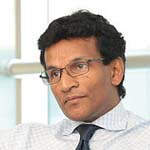 Session Chair
Thilan Wijesinghe
Founder, Chairman and CEO
TWCorp
Session Chair
Thilan Wijesinghe
Founder, Chairman and CEO
TWCorp
Thilan has been involved in setting up and running real estate companies since 2002. He has led the two largest listed property companies in Sri Lanka and co-founded the award winning resort, Ceylon Tea Trails, in partnership with makers of Dilmah Tea. He has also served on Boards of public sector statutory organizations such as the Urban Development Authority, National Housing Development Authority and Advisory Committee of the Tourism Authority. Thilan’s combined private and public sector experience has provided him with valuable experience covering all aspects of real estate development from regulatory and legal matters to construction.
 Keynote Speaker
Nayana Mawilmada
Director General
Urban Development Authority of Sri Lanka
Keynote Speaker
Nayana Mawilmada
Director General
Urban Development Authority of Sri Lanka
Nayana Mawilmada is an Urban Development Specialist with extensive experience in planning, facilitating, and managing large scale urban development, real estate and infrastructure projects across 15 countries. His diverse experience ranges from advising the Parliament of East Timor to leading numerous urban sector investments for the Asian Development Bank.
Immediately, prior to joining UDA, Mawilmada was the Managing Director at York Street Partners (Pvt.) Ltd., a Boutique investment Bank and TMS Company (Pvt) Ltd., a development focused consulting firm. His academic training includes MBA from Harvard Business School, a Master of City Planning from Massachusetts Institute of Technology (MIT) and a Bachelor of Architecture from Hampton University in the USA. Mawailmada is an old boy of Trinity College."
 Keynote Speaker
Professor P K S Mahanama
Professor- Department of Town & Country Planning
University of Moratuwa
Keynote Speaker
Professor P K S Mahanama
Professor- Department of Town & Country Planning
University of Moratuwa
Professor Mahanama has extensive experience in a diverse range of projects in urban design, planning and managing; coastal urban development, disaster resilient city development, climate resilience, vulnerability mapping, tourism development, environmental impact assessment, environment management information systems, social –economic impact evaluation, sustainable wetland conservation; carried out for public organizations and development agencies. Professor Mahanama earned his BA in Geography from University of Kelaniya and Masters Degree in Town and Country Planning from University of Moratuwa
 Panelist
Guido Bruggeman
Urban Transport Expert
Panelist
Guido Bruggeman
Urban Transport Expert
Guido Bruggeman is an urban transport expert with over 30 years’ of experience. He graduated as a transport engineer at the Academy for Transport and Traffic in the Netherlands and started his career at the Municipal Transport Company in Amsterdam.
In 2000, he joined the European Bank of Reconstruction and Development (EBRD) in London as an Urban Transport Specialist. In this position he was responsible for development of urban transport projects in Eastern-Europe and the former Soviet-Union.
Since 2007 he is acting as an independent consultant and advising city governments around the world about how to improve their urban transport system in a sustainable way. Mr. Bruggeman is recognised as an international expert having worked in over 25 countries around the world.
 Panelist
Suresh Rajendra
President
Property Industry Group | John Keells
Panelist
Suresh Rajendra
President
Property Industry Group | John Keells
Suresh Rajendra President Suresh Rajendra is responsible for the Property industry group of John Keells Holdings PLC. He has over 20 years of experience in the fields of finance, property and real estate, travel and tourism, and business development acquired both in Sri Lanka and overseas.
Prior to joining the Group, he was the Head of Commercial and Business Development for NRMA Motoring & Services in Sydney, Australia, Director/General Manager of Aitken Spence Hotel Managements (Pvt) Ltd. and also served on the Boards of the hotel companies of the Aitken Spence Group. Suresh is a Fellow of the Chartered Institute of Management Accountants, UK.
 Panelist
Michael Scharpf
Head - Sustainable Construction
Lafarge Holcim
Panelist
Michael Scharpf
Head - Sustainable Construction
Lafarge Holcim
He is responsible for the international alignment of activities on sustainable construction solutions across LafargeHolcim. The ambition is to provide tangible customer value with respect to the “Mexico Manifesto: Zero fossil energy – Zero emissions – Zero waste” which was developed during the Holcim Forum for Sustainable Construction held in Mexico City in 2010.
Sustainable Construction & Green Labels provides a “roadmap” for sustainable construction solutions, focusing on key customers and their specific needs in terms of sustainability such as saving water or energy, or building affordable housing with local materials. It is both an overview and starting point for the implementation of new sustainable construction solutions across a range of contexts.
Michael Scharpf worked as a mason before studying architecture at the University of Hannover, Germany and at the University of Lincoln, NE, USA. He holds an MBA from the University of Applied Sciences in Mainz, Germany. After holding several roles as architect and project manager in Germany, he joined the international consultancy firm Arcadis. Initially in charge of property due diligence, he built up the sustainable construction division which performed consultancy services on energy use and resource efficient, safe and comfortable buildings, and conducted BREEAM, DGNB and LEED certifications.
In this role he was a founding member of the German Sustainable Building Council (DGNB) in 2007 where he participated in the first-time development of the German Green Building Label. He is a DGNB-accredited auditor and member of the DGNB Construction Product Board.
Session 3 : Creating a World Class Transportation System in Colombo
The financial productivity, economic viability and livability of a city is closely linked to its capability to move people and goods economically, timely and conveniently with minimal impact on environment. Transport reflects the ties between various activities in a city. Transport systems do not only facilitate the movement of persons and goods. Their operating characteristics have a greater impact on land use, economic growth and quality of life. The infrastructure associated with transport is considered fundamental to the economic development of an area. Thus the efficiency and effectiveness of a city’s transport infrastructure has a direct bearing on the competitiveness.
Creating such an infrastructure is time consuming and require capital. But such investments are a necessity to any city that aspires to be ranked high on global competitiveness.
In Sri Lanka, the recent economic development is having a sizeable impact and demand on transport infrastructure. The increasing household income results in rise in the vehicle-use rate and that of the mobility of people. The accelerating economic and commercial activities increasingly demand conveyance for goods.
The city of Colombo has a day time Population of 2 million in a work day, this includes around 1.4 million of transit population who visit the city for employment or to engage in commercial, educational, recreation and other activities. The visitors to the city are increasing year after year. The massive multibillion Dollar developments that are taking place will also increase the city population, once competed within next few years. (Please see the infographic below)
Increasing traffic congestion in the city reflects the state of transportation in the city. The traffic congestions once limited to the Central Business District during morning and evening is now experienced throughout the day time, in everywhere in the city. The loss of productivity and damage to environment is estimated to be in Billions of Rupees every year. The vehicle emission is increasingly becoming a prime cause of respiratory deceases. These problems will exacerbate causing intense economic and social damages unless immediate measures are taken.
Many areas have been suggested to improve, including introduction of mass rapid transportation system to the improve public transportation, use of economic disincentives to reduce vehicle ownership and encourage use of public transportation, improve parking facilities, regulate entry of heavy vehicles and better pedestrian facilities.
Planners now can take the advantage of virtually infinite computing and modern design tools to design, develop and manage transport infrastructure for the city of Colombo which can significantly reduce travel time, congestion and decrease carbon emissions.
This session will explore:- The relationship between the quality of transportation infrastructure and city attractiveness and competiveness.
- Features of world class city transportation infrastructure, lessons from global cities on transportation innovation.
- The challenges to the city transportation infrastructure and possible solutions.
- Deploying technology to understand the accelerating demand for transportation, monitoring and managing the infrastructure.
 Session Chair
Gayani de Alwis
Chairperson Women in Logistics & Transport(WiLAT)
Management Consultant/Lecturer
Session Chair
Gayani de Alwis
Chairperson Women in Logistics & Transport(WiLAT)
Management Consultant/Lecturer
Gayani is an experienced supply chain professional who holds a MBA from Postgraduate Institute of Management (PIM) of University of Sri Jayewardenepura and MSc in Food Process Engineering from University of Reading, UK. She is a Certified Supply Chain Manager (CSCM) from ISCEA, USA.
Gayani was the former Director, Customer Service and Management Committee member of Unilever Sri Lanka LTD responsible for Supply Chain. She was the first female director for supply chain in South Asia for Unilever. During her 19 year tenure with Unilever locally and overseas, she has worked in Supply Chain, R&D and Quality Assurance prior to her early retirement to start her own consulting and lecturing career. She was the first Lead Auditor appointed from South Asia and has audited nearly 50+ manufacturing and supply chain operations across Unilever.
Gayani is the Chairperson of Women in Logistics and Transport (WiLAT) forum Sri Lanka. She is a Fellow and a Vice President ISMM and a Chartered member and a Vice Chairperson CILT. She is also a Board of Advisor for AIESEC SL. Currently she is a Consultant to many leading blue chip companies and a visiting faculty member for postgraduate programs in leading local and foreign universities.
 Keynote Speaker
Prof Amal S Kumarage PhD
Department of Transport & Logistics Management, Faculty of Engineering
University of Moratuwa
Keynote Speaker
Prof Amal S Kumarage PhD
Department of Transport & Logistics Management, Faculty of Engineering
University of Moratuwa
Amal Kumarage is a graduate in Civil Engineering of the University of Moratuwa, Sri Lanka. He completed his PhD at the University of Calgary, Canada. He is a Senior Professor in the Department of Transport & Logistics Management, University of Moratuwa, a Chartered Engineer and a Fellow of the Chartered Institute of Logistics and Transport.
Academic: He was responsible for the development of the Transportation Engineering Division of the University of Moratuwa (1990-1996), thereafter the introduction of the M.Sc. in Transport and the M.Eng. in Highway & Traffic Engineering, the MBA in Infrastructure and most recently the commencement of a new B.Sc. program in Transport & Logistics Management under a new department of study. He has published over 40 research papers winning the Prof EOE Pereira Award three times for the most outstanding research paper from the Institute of Engineers Sri Lanka. He is also known for the development of the Uniroad traffic Signals and TransPlan traffic model widely used in Sri Lanka.
Advisor: In an advisory capacity to the Government of Sri Lanka he has been instrumental in several important policy, strategy and feasibility studies in transport, highways, urban development and planning sectors. Among these are the Land Transport Policy, Bus Transport Policy, New Parking Regulations, the Colombo Metropolitan Regional Structure Plan, the Bus Fares Policy, the New Road Traffic Act, Road Safety Strategy, Traffic Management Action Plan and several others most of which were initiated and led by him. He has also served as an Advisor to the Government of the Maldives and in numerous studies undertaken for the World Bank, ADB and JICA in study projects in Sri Lanka and other countries.
Administrator: Prof Kumarage has served two terms as the Chairman of the National Transport Commission (2004-2005 & 2008-2010), where he has successfully negotiated and introduced several strategic reforms in the bus sector. He has served on the Board of Directors of several agencies including the Road Development Authority (1995-2001) responsible for the national roads in Sri Lanka and the state bus company, the Sri Lanka Transport Board (2004). He also served as the head of two different academic departments in university (2004, 2008-2011). He is also the Immediate Past Chairman of the Chartered institute of Logistics & Transport Sri Lanka (CILTSL) and currently a Vice President of CILT International.
Civil Society: He is the Vice-President of the Sri Lanka Baptist Sangamaya (2012 to date) and served as the General Secretary of the Fellowship of Christian University Students (FOCUS) from 1991 to 1996. He is a lay preacher and with his wife Premila are resource persons for training young leaders. They have two children Aloka married to Anushke, and Arush.
 Keynote Speaker
Mangal Dev
Director
Rail Systems Hitachi India
Keynote Speaker
Mangal Dev
Director
Rail Systems Hitachi India
Mangal Dev is Director of Hitachi India responsible for the Rail Systems Company for India and South Asia. He has experienced various customers and positions in Transportation Business in India and South Asia for over 20 years. Before joining Hitachi India, he led the strategy to establish and enhance ALSTOM portfolio for Rolling Stock, Signalling & Telecomm, Infrastructure and Turnkey portfolios.
He completed his Bachelor of Technology degree in Aerospace Engineering from Indian Institute of Technology in 1989 and recently completed advanced business management certificate course in International Business Strategy from INSEAD, Singapore and France.
He has been appointed as Director of Hitachi Rail Systems Company - representing India and South Asia to introduce Hitachi’s technology with high reliability & quality cultivated in Japanese market to Indian Society.
 Keynote Speaker
Guido Bruggeman
Urban Transport Expert
Keynote Speaker
Guido Bruggeman
Urban Transport Expert
Guido Bruggeman is an urban transport expert with over 30 years’ of experience. He graduated as a transport engineer at the Academy for Transport and Traffic in the Netherlands and started his career at the Municipal Transport Company in Amsterdam.
In 2000, he joined the European Bank of Reconstruction and Development (EBRD) in London as an Urban Transport Specialist. In this position he was responsible for development of urban transport projects in Eastern-Europe and the former Soviet-Union.
Since 2007 he is acting as an independent consultant and advising city governments around the world about how to improve their urban transport system in a sustainable way. Mr. Bruggeman is recognised as an international expert having worked in over 25 countries around the world.
 Panelist
Srikant Kadambi
Industry Market Development Manager
Microsoft APAC
Panelist
Srikant Kadambi
Industry Market Development Manager
Microsoft APAC
He is the APAC Industry Market Development Manager (IMDM) for Microsoft’s APAC Public Sector business – a role that plays a critical role in Microsoft’s on-going transformation to offering services off the Cloud & the subject matter expert for the energy industry.
Srikant has over 25 years’ experience in the I.T Industry, having worked for some of the most respected companies - the TATA conglomerate in India, Sun Microsystems, Hewlett Packard, and Microsoft. He also pioneered the evangelization of the rapid prototyping technology (better known today as 3D Printing) in India & across South East Asia, while heading the India operations at Stratasys Inc., as early as the mid 1990’s when 3D Printing technology was largely at its infancy. Srikant’s industry vertical experience spans across 18 years in both the Discrete & Process manufacturing industry.
 Panelist
Romesh David
President | Transportation Group
John Keells Holdings PLC
Panelist
Romesh David
President | Transportation Group
John Keells Holdings PLC
Romesh David, has been with the group for 27 years and has overall responsibility for the Transportation and IT industry groups.
He is a member of the National Council for Economic Development (Transport Cluster), a member of the Economic Infrastructure Sub-Committee of the Ceylon Chamber of Commerce and an executive committee member of the Chartered Institute of Logistics and Transport (Sri Lanka Branch). He is a past Chairman of the Sri Lanka Freight Forwarders’ Association and the Council for Business with Britain.
 Panelist
Nimal Chandrasiri
Additional Director General - Design
Road Development Authority
Panelist
Nimal Chandrasiri
Additional Director General - Design
Road Development Authority
Chandrasiri has extensive experience in designing and managing bridges, highways and structural engineering structural across four decades, holding senior position at Department of highways, River Valley Development Authority and Road Development Authority.
As the Project Director/ of Southern Transport Development Project he has been responsible for entire project management and monitoring with respect to funding, overall coordination, handling disputes & arbitration and deciding on all the technical and legal aspects of the project and liaising with government and non government authorities on matters related to land acquisition, utilities, compensation, relocation, grievance redressing.
He earned his BSc in Engineering and Masters in engineering in Structural Engineering from University of Moratuwa and is a Fellow of Institute of engineers of Sri Lanka. He is also member of several other professional bodies including the Chartered Institute of Arbitrators.
He also has published several technical papers in professional journals.
 Panelist
Lalithasiri Gunaruwan PhD
Senior Lecturer | Department of Economics
University of Colombo
Panelist
Lalithasiri Gunaruwan PhD
Senior Lecturer | Department of Economics
University of Colombo
Professional engagements include tenures as the Secretary to the Ministry of Transport of Sri Lanka, the General Manager of the Sri Lanka Railways, a Board Member of the Sri Lanka Transport Board, the National Engineering Research and Development Centre, and the Institute of Policy Studies of Sri Lanka. Research interests include public transportation, railways, energy and environmental economics, and investment planning.
Obtained B.Sc. (Physical Sciences) from the University of Colombo, M.Sc. (Energy Technology) from the Asian Institute of Technology, Bangkok, and Doctorate in Economics from the University of Paris Pantheon-Sorbonne.
Session 4 : Investment Strategies and Business Models for Building a Global City
Leading global cities are characterized by the presence of world-class intelligent and smart infrastructure and built environment. Investments in infrastructure results in productivity improvements and enhanced livability. Basic needs of a city drive the market for intelligent infrastructure solutions.
KPMG in a recent publication identified that in both the developed and developing world, cities are striving to provide a raft of critical urban infrastructure assets to support their burgeoning – in some cases unrelenting – growth; efficient transportation of people and goods, reliable and low-carbon energy, safe and secure water networks, comfort and security and efficient and scalable social infrastructure will all play central roles in enhancing the competitiveness of cities.
The financial productivity, economic viability and livability of a city is closely linked to its capability to move people and goods economically, timely and conveniently with minimal impact on environment. Transport reflects the ties between various activities in a city. Transport systems do not only facilitate the movement of persons and property. Their operating characteristics have a great impact on land use, economic growth and quality of life. The infrastructure associated with transport is considered fundamental to the economic development of an area. Thus the efficiency and effectiveness of a city’s transport infrastructure has a direct bearing on the competitiveness.
Infrastructure is an input to a wide range of industries and, as such, an important driver of long-term growth. At the same time, delays in the realization of infrastructure projects pose potentially large economic and social costs. Lack of well-performing infrastructure holds back economic development.
PURPOSEThe primary purpose of the session is to make the participants aware of the idiosyncrasies which characterize the challenge of funding infrastructure, need to develop sustainable business models and introduce some of the commonly available funding models and infrastructure management models.
This session will explore:- Challenges in funding infrastructure development.
- Importance of economic sustainability and financial viability.
- Challenges and opportunities unique to Colombo City.
- Funding sources and models.
- Business models for infrastructure management.
 Session Chair
Maninda Wickramasinghe
Managing Director
Fitch Ratings
Session Chair
Maninda Wickramasinghe
Managing Director
Fitch Ratings
Prior to joining Fitch Ratings Maninda worked as Head of Treasury & Corporate Finance at Dialog Telekom Plc., one of the largest telecommunications company in Sri Lanka. Prior to this he was a Senior Consultant with Ernst and Young for a period of two years.
Capital Market Master Plan Project with the SEC, register Clean Development Mechanism projects (CDM) with UNFCCC and bid process management on PPP projects for BOI were among the important assignments along with business plans and strategic plans for corporates. Maninda has 13 years experience in investment banking, and was the Group MD/CEO at First Capital a boutique investment bank. He also worked at Commercial Bank of Ceylon as a Treasury Dealer for 5 years.
He holds a Degree in Civil Engineering from the University of Bombay.
 Keynote Speaker
Kumudu Gunasekera PhD
Transport Economist Director
Stax Inc
Keynote Speaker
Kumudu Gunasekera PhD
Transport Economist Director
Stax Inc
Kumudu Gunasekera, Ph.D., is a Director in the Singapore office where he works with our global teams to deliver actionable insights to clients worldwide.
Prior to joining Stax, Kumudu was a Principal with Parsons Brinckerhoff (Washington D.C.), the professional services arm of Balfour Beatty, a global infrastructure group that delivers services essential to the development, creation and care of infrastructure assets; from finance and development, through design and project management to construction and maintenance. At Parsons Brinckerhoff, Kumudu successfully led global, multi-disciplinary consulting teams on large (> $ 1 million) and small (< $ 1 million) strategic consulting assignments in Burkina Faso, Canada, Curacao, England, Mali, Nigeria, Panama, Scotland, Qatar, Sri Lanka, and the United States. He was the project director and chief model architect of PRISMTM proprietary (U.S patent pending) transportation software.
Kumudu was the founding editor (2006-2013) of the Economic Forecasting Review and a monthly columnist (2007-2013) of Roads & Bridges. Additionally, he has published numerous articles in peer-reviewed journals and industry magazines; has presented at conferences, workshops, focus groups, and stakeholder meetings in Canada, Pakistan, Panama, Scotland, Sri Lanka, and the United States; and has instructed numerous undergraduate, graduate, and professional courses.
Kumudu earned his Ph.D. in Economic Geography, and a joint M.A. in International Relations and Environmental Policy from Boston University. He has a B.A. in Economics from Hobart and William Smith Colleges.
 Keynote Speaker
Arnaud Cachard
Head of Export Credit and Global Specialised Finance Asia Project and Export Finance, Capital Finance, Asia Pacific
HSBC
Keynote Speaker
Arnaud Cachard
Head of Export Credit and Global Specialised Finance Asia Project and Export Finance, Capital Finance, Asia Pacific
HSBC
 Keynote Speaker
Yasushi Taira PhD
Senior Representative
JICA
Keynote Speaker
Yasushi Taira PhD
Senior Representative
JICA
Dr. Yasushi Taira is currently Senior Representative at the Sri Lanka Office of Japan International Cooperation Agency (JICA) - the executing arm for Japan's bilateral development assistance and the world's largest bilateral development assistance agency. Dr. Taira received his Bachelor's Degree in Law from Keio University of Japan, and MSc. in Regional Science and Ph.D in Applied Economics from Cornell University in USA. He has 15 years' experience in international development financing first at Japan Bank for International Cooperation (JBIC) and then at JICA after the development financing arm of JBIC was merged with JICA.
He also completed a two-year assignment as Section Chief of the Development Institutions Division of Japan's Ministry of Finance, which has oversight for multilateral development banks such as the World Bank, and ADB. As a member of one of the key financing institutions for infrastructure development in Asia, Dr. Taira's experience and involvement covers JICA's development assistance and operations strategy, and oversight and coordination of JBIC/JICA investment projects mainly in South-East and South Asia. Key infrastructure projects under his purview include construction of Swarnabhoomi Airport in Bangkok, Thailand and feasibility study for the Monorail system for Colombo, Sri Lanka.
 Panelist
Thilan Wijesinghe
Founder Chairman and CEO
TWCorp
Panelist
Thilan Wijesinghe
Founder Chairman and CEO
TWCorp
Thilan has been involved in setting up and running real estate companies since 2002. He has led the two largest listed property companies in Sri Lanka and co-founded the award winning resort, Ceylon Tea Trails, in partnership with makers of Dilmah Tea. He has also served on Boards of public sector statutory organizations such as the Urban Development Authority, National Housing Development Authority and Advisory Committee of the Tourism Authority. Thilan’s combined private and public sector experience has provided him with valuable experience covering all aspects of real estate development from regulatory and legal matters to construction.
 Panelist
Amali Rajapaksa
Senior Infrastructure Specialist | South Asia
World Bank
Panelist
Amali Rajapaksa
Senior Infrastructure Specialist | South Asia
World Bank
Amali joined the Bank in late 2003 as an Infrastructure Specialist covering the Bank’s portfolio on transport, energy and water. During this time she has also been involved in the Bank’s energy projects in India and Pakistan. Having joined at the inception of the Bank’s involvement in the transport sector, she has contributed greatly to the growth of the transport sector within the Bank’s portfolio in Sri Lanka.
Prior to joining the Bank, Amali has worked for the Government of Sri Lanka at the Bureau of Infrastructure Investments which was responsible for facilitating private investment in to infrastructure projects. During this time she worked as Director (Power and Ports) specializing in providing financial advise on Public-Private Partnership (PPP) transactions for a period of seven years. In this capacity she has been involved in the negotiation of several independent power plants, the first PPP transaction in the Port sector as well as work associated with the restructuring of the Power Sector. Prior to this, she has worked for IBM in the United Kingdom.
Amali is a fellow of the Chartered Institute of Management Accountants (UK) with a Masters degree in Business Finance from Brunel University in UK.
Session 5 : Reimagining Colombo Through Technology
Technology and innovation are always large catalysts of change, but these changes tend to happen in the private sector first.
However, these changes can be instilled within government as well. During the recent past there has been a momentum gathering on deploying technology for urban development and management with an objective of improving livability and city management.
Citizens and businesses can now expect more seamless, personalized, and convenient self-service options for interacting with government organizations, across multiple channels, regardless of time and location. How such expectations of citizens and businesses could be met through deployment of technology?
Technology makes infrastructure intelligent. Solutions for sustainable power distribution, efficient traffic systems and efficient, intelligent buildings are contributing to resilience and sustainability of cities. Integrated systems and automated technologies such as smart grids, intelligent buildings and mobility solutions to keep people on the move help to create a smart infrastructure built to last.
This session will help the audience to understand how the technology is:
- Making cities resilient and sustainable.
- Enhancing the livability of cities.
- Improving the citizen services.
- Making city governments transparent, collaborative, accountable, productive and efficient.
 Session Chair
Rohan Jayaweera
COO
Antyra Solutions and Fmr Country Consultant/Google
Session Chair
Rohan Jayaweera
COO
Antyra Solutions and Fmr Country Consultant/Google
Rohan was the first employee of Google for Sri Lanka and during his time he helped brands, organizations and the Sri Lankan government to develop its digital practices. He managed all engagements to and from Google for Sri Lanka during his tenure, which included digital practice, policy framework, publisher, video & telco partnerships, community and entrepreneurship development. Rohan has a deep understanding of channel/partner synergies and eco-system development having worked for some of the leading technology brands in the world.
Rohan is passionate about entrepreneurship. He is a key note speaker, presenter, and moderator for numerous events & was invited to speak at the inaugural TEDx in SL on entrepreneurship.
 Keynote Speaker
Jaijit Bhattacharya PhD
Partner, Infrastructure and Government Services
KPMG India
Keynote Speaker
Jaijit Bhattacharya PhD
Partner, Infrastructure and Government Services
KPMG India
Jaijit Bhattacharya is a noted Government transformation expert and is Partner at KPMG. He is also President of Centre for Digital Economy Policy Research (C-DEP)and Adjunct Professor at IIT Delhi. He has been responsible for the creation of the next generation of solutions for governments, based on open standards. Bhattacharya advises governments on e-governance strategies.
He is an e-Governance advisor to Government of Sri Lanka and has been conducting training for ADB institute in Tokyo on Public Expenditure Management and has helped World Bank develop curriculum for their e-Leadership program. Bhattacharya was also part of the Army IT Advisory Committee constituted by the then Chief of Army Staff. He also delivers invited lectures at INSEAD Singapore campus, IIT Roorkee and at IIM Calcutta. Bhattacharya also coined the terms "Technological Sovereignty" and "Participative Governance"
 Keynote Speaker
Vivek Puthucode
General Manager – APAC
Microsoft
Keynote Speaker
Vivek Puthucode
General Manager – APAC
Microsoft
Vivek Puthucode is the Public Sector business leader for Microsoft Asia Pacific region responsible for all aspects of the business driving Microsoft’s strategy and execution in Public Sector. Vivek has more than 18 years’ experience in delivering ICT projects and program to Public Sector agencies particularly in Australia and New Zealand Government. Prior to joining Microsoft, Vivek worked for SAP leading their Public Services and Healthcare business for the Asia Pacific and Japan region.
 Keynote Speaker
Ravinder Pal Singh
Consulting Director – Internet of Everything & Smart Communities
Cisco Consulting Services
Keynote Speaker
Ravinder Pal Singh
Consulting Director – Internet of Everything & Smart Communities
Cisco Consulting Services
Ravinder Pal Singh is a Senior Consultant and Expert in Digital infrastructure solutions to create Smart & connected Communities. Ravinder has more than 19 years experience in the business & technology consulting, Enterprise Architecture and solutions mainly in the areas of Industry vertical solutions (Real Estate, Healthcare, Education, Media, Manufacturing etc), Data center, Collaboration and network technology Solutions. Ravinder has managed several roles mainly in Enterprise Architecture, Solution Architecture & design, Project & Program management, Service delivery and services Management. A Certified project manager (PMP), IT Services Management (ITIL) & Enterprise Architect (TOGAF), he has extensive experience in Technology infrastructure for effective Workplace, IT service management based on ITIL framework, Information security processes (ISO27001/BS7799), quality process compliance (ISO9000), LEED certification and quality processes improvement areas based on six Sigma and DMAIC foundations.
Ravinder has consulted and managed projects with diverse streams of segments like govt, manufacturing, R&D, Media, IT & ITES, Telcos and Retail customers. He has 2 patent applications submitted in the areas of Data center and Security.
Ravinder is a regular speaker in national and international forums around Internet of Everything and Smart Communities. Some of his articles have been published in leading publications.
 Panelist
Arunesh Peter
Cheif of Projects
ICTA
Over 20 years’ experience in Information Communication Technology. Started after school as a programmer of business systems development and implementation at DMS Software Technologies. A diversified career in ICT covering solution sales, systems integration, project management, ICT consultancy, sales and marketing consultancy.
Worked with many of the leading ICT companies in Sri Lanka, and has been associated with diverse brands like WANG, Sun Microsystems, Compaq, IBM, JBA System 21, BPiCKS, Syteline ERP and SAP to name a few.
Passion –People Transformation, Slogan “Transformed People = Transformed Nation”
Current Responsibilities – Leader of the ICTA Project Management and Deployment teams.
Panelist
Arunesh Peter
Cheif of Projects
ICTA
Over 20 years’ experience in Information Communication Technology. Started after school as a programmer of business systems development and implementation at DMS Software Technologies. A diversified career in ICT covering solution sales, systems integration, project management, ICT consultancy, sales and marketing consultancy.
Worked with many of the leading ICT companies in Sri Lanka, and has been associated with diverse brands like WANG, Sun Microsystems, Compaq, IBM, JBA System 21, BPiCKS, Syteline ERP and SAP to name a few.
Passion –People Transformation, Slogan “Transformed People = Transformed Nation”
Current Responsibilities – Leader of the ICTA Project Management and Deployment teams.Resources
RETHINKING CITIES How do we go about bringing shared prosperity and ensure that development benefits the broad swath of population- and especially the bottom 40 percent of people living under 4 dollars a day? It is by no means an exaggeration to say that the path to shared prosperity inevitably runs through cities. Read more … SMART CITIES OR SMART PILOTS? The National Democratic Alliance government's ambitious Smart Cities programme will at best be able set up only 100 pilot projects in the first five years. Contrary to general perception, no 'smart city' will be created in the next five years, though a successful programme could see several smart colonies come up across the country. Read more … ONE MAN'S PLAN TO BUILD SINGAPORE IN INDIA SENDS LAND SOARING A short man with frayed clothes and hands made rough from long years of farming, K. Subba Rao stands under the sun in his village in southern India, as the creases on his weathered face break into a sly grin. "I’m going to be a rich man," he says. Amid banana plantations and cotton patches in Uddandarayunipalem, it seems like everyone’s convinced they’ve hit the jackpot. Other farmers chime in with shouts of "Shopping Malls!", "Apartments!", "Jobs!" Read more … Stockholm is Europes fastest growing city New iPad Act - Stockholm with Charlie Caper and Erik Rosales - from MIPIM in Cannes v 3 Stockholm iPad act 2 ft Whiteboard Technology Stockholm Perspective HOW TO TRANSFORM INDIAN CITIES INTO SMART CITY - THE KPMG WAY DOCUMENTS SKYTRAIN - Integrated Transport System with Monorail Urban Transport Master Plan for Colombo JICA DOCUMENTS JICA Sri Lanka Profile JICA Road Map - Side 1 JICA Road Map - Side 2Microsoft CityNext
CITY OF BUENOS AIRES [MICROSOFT] The city of Buenos Aires places great importance on meeting the needs of its citizens, as well as the commuters and tourists who come into the city every day. Working with Microsoft and its partners, the city has explored ways that technology can streamline local government, improve information access and citizen-centric services, and empower the city’s youth to build a better future. Through its participation in the Microsoft CityNext initiative, Buenos Aires is developing innovative solutions to modernize the city. Read more … CLOUD and POWER BI TRANSFORM DATA INTO ACTION WINDOWS 10 – THE ONES WHO WILL DO GREAT THINGS WELCOME TO OUR OFFICE – HANGAR REINVENTING PRODUCTIVITY VIDEO CityNext Public Website: http://www.microsoft.com/en-us/citynext/default.aspx CityNext Public Blog: http://www.microsoft.com/en-us/citynext/blogs/default.aspx#fbid=cQ77Hpfpii2 Microsoft City next white paper : Click here A new definition for citizen service: Click hereCinnamon Life
A GAME CHANGER, CINNAMON LIFE, THE FLAGSHIP BUILDING OF COLOMBO IS LAUNCHED A trendsetting project in Sri Lanka, Cinnamon Life has been launched with pride by Waterfront Properties (Private) Limited, a member of the John Keells Group. This architectural icon has been envisioned as a 4.5 million sqft Integrated Resort consisting of an 800-room luxury Cinnamon hotel, avant garde experiential and entertainment haven, residential apartments, state-of-the-art office spaces, a wide variety of food & beverage offerings and ballroom, conferencing, theater and banqueting spaces. This mixed development project is Sri Lanka’s largest private sector investment. Cinnamon Life, with its vibrant and inspired concept, is a project of significant national importance and will become the epicenter of modern South Asia. This integrated resort development will be executed as a ‘life capital’, an architectural heart beat, where different aspects of life, living, working and playing blend seamlessly, interacting with one another, empowering one another in new and exciting ways. Internationally renowned Architect, Artist and Engineer, Cecil Balmond, the design visionary behind some of the most popular buildings in the world, including the ArcelorMittal Orbit in London and the CCTV Tower in Beijing will be bringing this inspired concept to life, while a consortium of contractors headed by Hyundai Engineering and Construction are the contractors for the project. With Cinnamon Life, Balmond has dreamed up a design that combines a contemporary international feel, with a local flavor. He is determined to use Sri Lanka’s largest private sector investment as a chance to put the nation on the world map. “Looking at it from an architecture and design point of view, it will be a composition of several forms. It will be like nothing Sri Lanka has ever seen. The integrated nature, unique design and the lifestyle it offers will make this the flagship development of Sri Lanka. The shape and form of the project is such that it will stand as a guard stone for the city,” he emphasizes. The structure of the project provides a backdrop to the city and the sea. It has massive projections which are powerful dynamic statements in architecture. The scalloped form gives it a romantic shape and mirrors the Beira Lake. The structure reflects a functional, yet aspirational feel with the massive projections which will provide a theatrical sensation for those within, to watch the city in the front and the drama within the architecture itself. Articulating the John Keells’ vision for Cinnamon Life, Ajit Gunewardene, Deputy Chairman of the company, commented: “Cinnamon Life was conceptualized as a flagship project for Sri Lanka as it stakes its claim in the international arena after decades of remaining on the sidelines. The first of its kind in the region, Cinnamon Life will shine bright like a beacon of prosperity and help support the country’s development. Locals and tourists need a destination to gather and enjoy themselves when they work, live or play and Cinnamon Life will be their playground! The integrated resort concept will attract investors, high-end brands, leisure and business travellers and local populace who will be compelled to be part of its unique contemporary ethos. This project will generate numerous benefits for the economy and the community. More importantly, Cinnamon Life will engender a sense of pride to be Sri Lankan as it will signal the march of the country towards a vibrant future.” The Property arm of the John Keells Group has successfully executed prominent landmarks such as Monarch and Emperor at Crescat City; Onthree20; and its latest project, 7th Sense - Gregory’s Road. Mr. Suresh Rajendra, President of the JKH Property Group, commented, “The legendary reputation of the company precedes us in the marketplace and we are overwhelmed by the expressions of interest for bookings for ‘The Residence’. In fact, I am happy to announce that 40 percent of the first tower is already booked. John Keells will be replicating its successful guaranteed rental scheme which was operational at both its Emperor and Monarch projects. A similar scheme with a fixed guaranteed annual return for a limited number of apartments for a limited period will be available for Cinnamon Life. Another attractive feature is the state of the art, 24 story office space, half of which will be operated by the developers themselves and the remaining will be sold on an outright basis. We remain steadfast in our commitment to deliver the highest gains for this project.” Based on its sheer scale and powerful ambition, Cinnamon Life will showcase Sri Lanka’s aspirations and reliability to the region and define Sri Lanka as the place where possibilities are endless. CINNAMON LIFE - IMAGES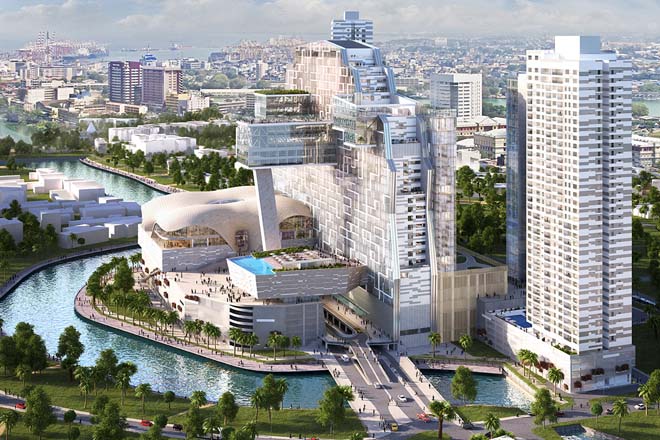
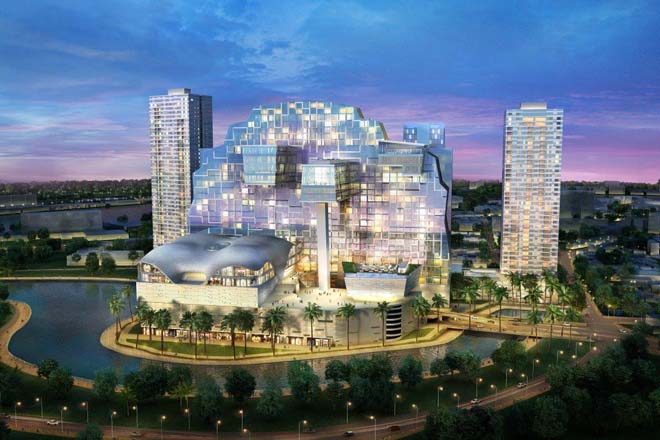
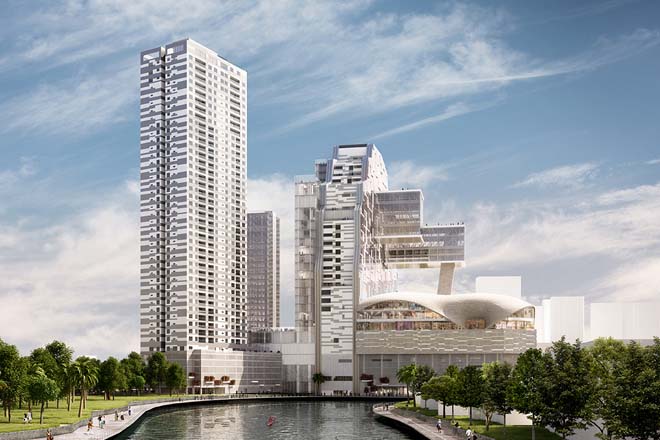
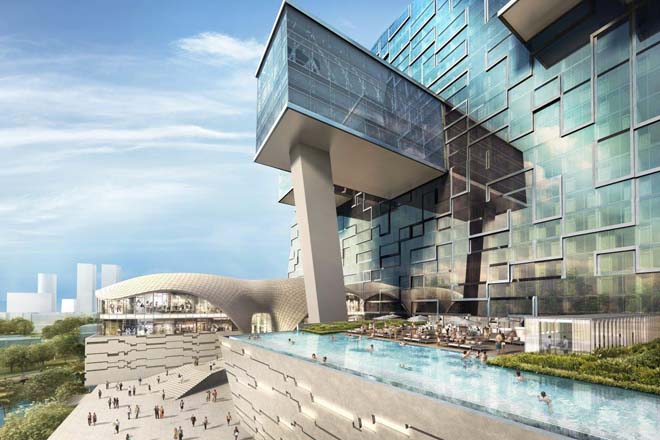 CINNAMON LIFE - VIDEOS
CINNAMON LIFE - DOCUMENTS
Residence Cinnamon Life - Price Grid
Residence Layouts
CINNAMON LIFE - VIDEOS
CINNAMON LIFE - DOCUMENTS
Residence Cinnamon Life - Price Grid
Residence Layouts